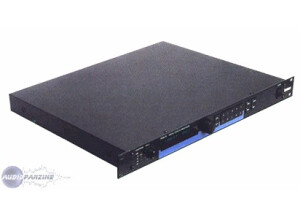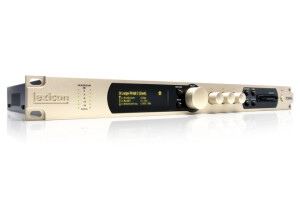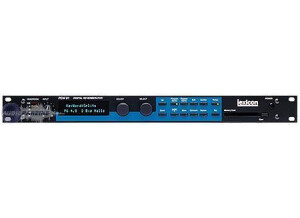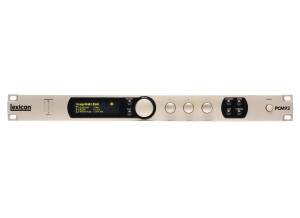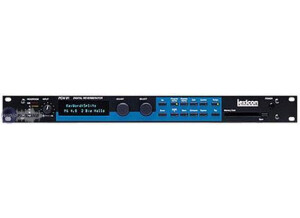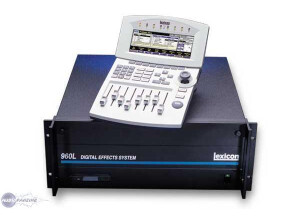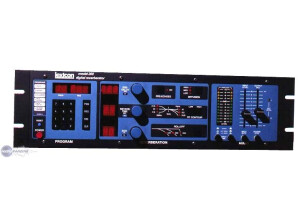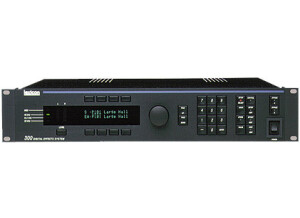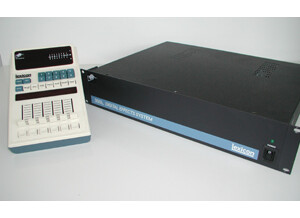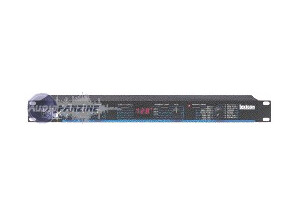Tech. sheet
User reviews
4.5/5(4 reviews)
5
50 %
4
50 %
3
2
1
A very basic oldie but goodie
Published on 08/27/11 at 12:51The Lexicon PCM 60 is a 16-bit mono in/"stereo" out digital reverbration unit dating to the mid-1980s.
The unit is a dead-simple bare bones affair, with only two main programs: Plate and Room. For either program, there are two banks of four additional shaping settings: one for decay time, from short to long, and another set for effect size, from small to large, which also affects perceived reverb time. The only other sonic shaping available are two "Contour" filters, one for bass and the other for treble.
The unit's front panel also has controls for input and output level trims, effect mix from 0% to 100%, a bypass switch and unit power. Metering is a color-coded 5-segment...…
The unit is a dead-simple bare bones affair, with only two main programs: Plate and Room. For either program, there are two banks of four additional shaping settings: one for decay time, from short to long, and another set for effect size, from small to large, which also affects perceived reverb time. The only other sonic shaping available are two "Contour" filters, one for bass and the other for treble.
The unit's front panel also has controls for input and output level trims, effect mix from 0% to 100%, a bypass switch and unit power. Metering is a color-coded 5-segment...…
Read more
The Lexicon PCM 60 is a 16-bit mono in/"stereo" out digital reverbration unit dating to the mid-1980s.
The unit is a dead-simple bare bones affair, with only two main programs: Plate and Room. For either program, there are two banks of four additional shaping settings: one for decay time, from short to long, and another set for effect size, from small to large, which also affects perceived reverb time. The only other sonic shaping available are two "Contour" filters, one for bass and the other for treble.
The unit's front panel also has controls for input and output level trims, effect mix from 0% to 100%, a bypass switch and unit power. Metering is a color-coded 5-segment affair that is easily viewed.
All connections are at the rear panel, are all analog, and are all 1/4" jacks. There is one input, "stereo" (but not true-stereo) output, and effects loop, and a footswitch jack for bypassing which I have never used. Operating levels in and out are switchable between +4dBu and -20dBv.
If you're after a multieffect unit, this isn't it. I rate this section based on what this unit IS--a simple reverb unit and NOT a multieffects unit. It does only what it endeavors to, and no more. That's good enough for me!
UTILIZATION
Reverb Units don't get much simpler than the PCM60. There are no displays, no menus to scroll through, just a single row of pushbuttons. Settings are easy as pie and although there's no recall, all you need to do is kick it old-school, write down the button and knob settings and keep that with your other sessions notes (you DO keep your sessions nice and organized, right??
Setting input and output levels are simple, and the rotary pots are still smooth and reliable after all these years.
I prefer to use it as a mono-in, mono-out unit, preferring true stereo in and out reverb units where possible.
The manual is perfectly adequate; it explains the basic functions of the unit complete with pics and example settings, and also has a page that you can copy for recall sheets.
SOUND QUALITY
This is a 16-bit unit, so care should be taken to leave some headroom on the input level--we don't want any squared-off 80's digital distortion, now, do we!?
The quality of the reverbs is surprisingly good considering the vintage. The PCM60 has the familiar Lexicon family musical (but not transparent) character of sound to it. Bottom is smooth; higher frequencies come off as grainy yet lush, and smoother with the Treble Countour engaged.
The Countour filters are especially useful for vocal and drum reverbs; engaging them essentially rolls off highs or lows for a more absorbed sound at the frequency extremes.
The sounds this unit produces are of course limited, but when they work for a source (you will quickly find out if it does or not by twiddling a couple knobs and pushing a few different buttons), they work very well and sound...for lack of a better expression, nice!
I tend to go for the plate sounds more often and especially for vocals and drums, but the room program has its place, especially for some vocals and the odd guitar or drum track.
OVERALL OPINION
PCM60s seem to be trading today for around $400 give or take, which is a bit of a surprise. I'm not sure it represents the best value at that price, considering other, more feature-packed and sonically diverse units at that price and particularly on the used market (where there are also more modern Kurzweils, TCs, Yamahas, lower end Lexis etc)...but for a good classic Lexi and "vintage character piece," the price of entry is on the more doable end of things. The PCM60 will appeal to persons after a musical two-trick pony with a classic sound and character that other units don't achieve--the PCM60 does have its own place in the digital reverb world. If you can get a really good deal on the price and want a couple interesting reverbs of the Lexi variety, I say go for it.
The unit I'm most familiar with dates to the mid-80s and it's dead reliable, doesn't skip a beat.
The unit is a dead-simple bare bones affair, with only two main programs: Plate and Room. For either program, there are two banks of four additional shaping settings: one for decay time, from short to long, and another set for effect size, from small to large, which also affects perceived reverb time. The only other sonic shaping available are two "Contour" filters, one for bass and the other for treble.
The unit's front panel also has controls for input and output level trims, effect mix from 0% to 100%, a bypass switch and unit power. Metering is a color-coded 5-segment affair that is easily viewed.
All connections are at the rear panel, are all analog, and are all 1/4" jacks. There is one input, "stereo" (but not true-stereo) output, and effects loop, and a footswitch jack for bypassing which I have never used. Operating levels in and out are switchable between +4dBu and -20dBv.
If you're after a multieffect unit, this isn't it. I rate this section based on what this unit IS--a simple reverb unit and NOT a multieffects unit. It does only what it endeavors to, and no more. That's good enough for me!
UTILIZATION
Reverb Units don't get much simpler than the PCM60. There are no displays, no menus to scroll through, just a single row of pushbuttons. Settings are easy as pie and although there's no recall, all you need to do is kick it old-school, write down the button and knob settings and keep that with your other sessions notes (you DO keep your sessions nice and organized, right??
Setting input and output levels are simple, and the rotary pots are still smooth and reliable after all these years.
I prefer to use it as a mono-in, mono-out unit, preferring true stereo in and out reverb units where possible.
The manual is perfectly adequate; it explains the basic functions of the unit complete with pics and example settings, and also has a page that you can copy for recall sheets.
SOUND QUALITY
This is a 16-bit unit, so care should be taken to leave some headroom on the input level--we don't want any squared-off 80's digital distortion, now, do we!?
The quality of the reverbs is surprisingly good considering the vintage. The PCM60 has the familiar Lexicon family musical (but not transparent) character of sound to it. Bottom is smooth; higher frequencies come off as grainy yet lush, and smoother with the Treble Countour engaged.
The Countour filters are especially useful for vocal and drum reverbs; engaging them essentially rolls off highs or lows for a more absorbed sound at the frequency extremes.
The sounds this unit produces are of course limited, but when they work for a source (you will quickly find out if it does or not by twiddling a couple knobs and pushing a few different buttons), they work very well and sound...for lack of a better expression, nice!
I tend to go for the plate sounds more often and especially for vocals and drums, but the room program has its place, especially for some vocals and the odd guitar or drum track.
OVERALL OPINION
PCM60s seem to be trading today for around $400 give or take, which is a bit of a surprise. I'm not sure it represents the best value at that price, considering other, more feature-packed and sonically diverse units at that price and particularly on the used market (where there are also more modern Kurzweils, TCs, Yamahas, lower end Lexis etc)...but for a good classic Lexi and "vintage character piece," the price of entry is on the more doable end of things. The PCM60 will appeal to persons after a musical two-trick pony with a classic sound and character that other units don't achieve--the PCM60 does have its own place in the digital reverb world. If you can get a really good deal on the price and want a couple interesting reverbs of the Lexi variety, I say go for it.
The unit I'm most familiar with dates to the mid-80s and it's dead reliable, doesn't skip a beat.
See less
30
»
Published on 04/11/06 at 02:11 (This content has been automatically translated from French)
Reverb Room or Plate
UTILIZATION
Ultra simple
2 choices of reverb (room or flat) / 4 size piece / 4 length / bass and treble contour
SOUND QUALITY
No reverb Queudes metal, that is natural and beautiful ... wonderful.
Just a bit of breath but ... is minimal
OVERALL OPINION
I tried the 300 LEXICON agree it's a step up, but not c the same price!
I test the M2000 I am not a fan of the color of his (too cold) ... So for less than 600 euros I say PCM 60.
To live the PMK 60 is perfect and nothing to do with bluffing the SPX 990, M OneXL lexicon or other low-end .... j'adooooooooooooooooooooooooooooooooooooooooooooore. …
UTILIZATION
Ultra simple
2 choices of reverb (room or flat) / 4 size piece / 4 length / bass and treble contour
SOUND QUALITY
No reverb Queudes metal, that is natural and beautiful ... wonderful.
Just a bit of breath but ... is minimal
OVERALL OPINION
I tried the 300 LEXICON agree it's a step up, but not c the same price!
I test the M2000 I am not a fan of the color of his (too cold) ... So for less than 600 euros I say PCM 60.
To live the PMK 60 is perfect and nothing to do with bluffing the SPX 990, M OneXL lexicon or other low-end .... j'adooooooooooooooooooooooooooooooooooooooooooooore. …
Read more
Reverb Room or Plate
UTILIZATION
Ultra simple
2 choices of reverb (room or flat) / 4 size piece / 4 length / bass and treble contour
SOUND QUALITY
No reverb Queudes metal, that is natural and beautiful ... wonderful.
Just a bit of breath but ... is minimal
OVERALL OPINION
I tried the 300 LEXICON agree it's a step up, but not c the same price!
I test the M2000 I am not a fan of the color of his (too cold) ... So for less than 600 euros I say PCM 60.
To live the PMK 60 is perfect and nothing to do with bluffing the SPX 990, M OneXL lexicon or other low-end .... j'adooooooooooooooooooooooooooooooooooooooooooooore.
UTILIZATION
Ultra simple
2 choices of reverb (room or flat) / 4 size piece / 4 length / bass and treble contour
SOUND QUALITY
No reverb Queudes metal, that is natural and beautiful ... wonderful.
Just a bit of breath but ... is minimal
OVERALL OPINION
I tried the 300 LEXICON agree it's a step up, but not c the same price!
I test the M2000 I am not a fan of the color of his (too cold) ... So for less than 600 euros I say PCM 60.
To live the PMK 60 is perfect and nothing to do with bluffing the SPX 990, M OneXL lexicon or other low-end .... j'adooooooooooooooooooooooooooooooooooooooooooooore.
See less
50
»
Published on 12/07/09 at 05:35 (This content has been automatically translated from French)
reverb "passive" ultra simple, flat or room, 4 room sizes, 4 rev one time and two filters to boost the bass, the other to reduce treble 1xIN/2xOUT in jack +4 / -10
UTILIZATION
nothing to say, my 5 year old boy quite understand how it works !!!!!!!!
SOUND QUALITY
Top Top Top Top Top of the 80's !!!!!
I am an absolute fan of her's ROOM!! it's just super simple, not pretentious, it sounds almost like a 200, the short program with small sizes of rooms are hot, always leave the filter that smooths down the treble, he does so well, with that boosts serious jadore in drum making: 2233 (or room, Size2, time3 and sunk two filters), or try also 2332.
try flat in 1133 is flat, room...…
UTILIZATION
nothing to say, my 5 year old boy quite understand how it works !!!!!!!!
SOUND QUALITY
Top Top Top Top Top of the 80's !!!!!
I am an absolute fan of her's ROOM!! it's just super simple, not pretentious, it sounds almost like a 200, the short program with small sizes of rooms are hot, always leave the filter that smooths down the treble, he does so well, with that boosts serious jadore in drum making: 2233 (or room, Size2, time3 and sunk two filters), or try also 2332.
try flat in 1133 is flat, room...…
Read more
reverb "passive" ultra simple, flat or room, 4 room sizes, 4 rev one time and two filters to boost the bass, the other to reduce treble 1xIN/2xOUT in jack +4 / -10
UTILIZATION
nothing to say, my 5 year old boy quite understand how it works !!!!!!!!
SOUND QUALITY
Top Top Top Top Top of the 80's !!!!!
I am an absolute fan of her's ROOM!! it's just super simple, not pretentious, it sounds almost like a 200, the short program with small sizes of rooms are hot, always leave the filter that smooths down the treble, he does so well, with that boosts serious jadore in drum making: 2233 (or room, Size2, time3 and sunk two filters), or try also 2332.
try flat in 1133 is flat, room size mini, rev 3-time and two switched filters! I love, too much density, very realistic, easily mixable.
OVERALL OPINION
A great machine, mine is flawless, many say that this blows the mine, with the filter hardly acute, less than my first generation PCM80! and I do not try to sell it !!!!!!! I adore, I even attempt a second. color very special, the very wood and warm side of the reverb, modulation and vintage music of the tail, the simplicity and the requirement to do with what is a. a philosophy in itself, this machine will remain in my opinion the greatest achievement of simplification of a top model (200 and 224) go for it! go for it! go for it!
UTILIZATION
nothing to say, my 5 year old boy quite understand how it works !!!!!!!!
SOUND QUALITY
Top Top Top Top Top of the 80's !!!!!
I am an absolute fan of her's ROOM!! it's just super simple, not pretentious, it sounds almost like a 200, the short program with small sizes of rooms are hot, always leave the filter that smooths down the treble, he does so well, with that boosts serious jadore in drum making: 2233 (or room, Size2, time3 and sunk two filters), or try also 2332.
try flat in 1133 is flat, room size mini, rev 3-time and two switched filters! I love, too much density, very realistic, easily mixable.
OVERALL OPINION
A great machine, mine is flawless, many say that this blows the mine, with the filter hardly acute, less than my first generation PCM80! and I do not try to sell it !!!!!!! I adore, I even attempt a second. color very special, the very wood and warm side of the reverb, modulation and vintage music of the tail, the simplicity and the requirement to do with what is a. a philosophy in itself, this machine will remain in my opinion the greatest achievement of simplification of a top model (200 and 224) go for it! go for it! go for it!
See less
180
»
Published on 08/08/10 at 04:56 (This content has been automatically translated from French)
Reverberation of his statements released in 1984. You have 2 programs FLAT or ROOM reverb with various possible combinations of pre-delays and impairments is made in more than a hundred opportunities that are available to the user.
UTILIZATION
For editing sounds, you have 4 functions:
Programs: (FLAT or ROOM)
size: Simulation parameters for the volume of "parts" under consideration, ie we varied the pre-period. Schwitches identified four of Small to Large (pre-delay time of 1 ms to 46 ms)
Reverb Time: 4 new Schwiter identified by Short to Long allow the choice of the attenuation of the processed signal, ie the decay time complies fully with the law of Sabine. The range is from...…
UTILIZATION
For editing sounds, you have 4 functions:
Programs: (FLAT or ROOM)
size: Simulation parameters for the volume of "parts" under consideration, ie we varied the pre-period. Schwitches identified four of Small to Large (pre-delay time of 1 ms to 46 ms)
Reverb Time: 4 new Schwiter identified by Short to Long allow the choice of the attenuation of the processed signal, ie the decay time complies fully with the law of Sabine. The range is from...…
Read more
Reverberation of his statements released in 1984. You have 2 programs FLAT or ROOM reverb with various possible combinations of pre-delays and impairments is made in more than a hundred opportunities that are available to the user.
UTILIZATION
For editing sounds, you have 4 functions:
Programs: (FLAT or ROOM)
size: Simulation parameters for the volume of "parts" under consideration, ie we varied the pre-period. Schwitches identified four of Small to Large (pre-delay time of 1 ms to 46 ms)
Reverb Time: 4 new Schwiter identified by Short to Long allow the choice of the attenuation of the processed signal, ie the decay time complies fully with the law of Sabine. The range is from 0.2 s to 4.5 s, depending on programs and pre-selected delays.
contour: these 2 schwiches provide fine tuning of overall color of the reverb (or dark)
The usage is very intuitive and easy.
SOUND QUALITY
The PCM 60 is comfortable on all sources without difficulty, with a grain particularly flattering. It provides the strings and brass spaces very realistic ..
OVERALL OPINION
A very good machine, it is impossible to commit an error in handling both the ergonomics was thought best to streamline interventions ..
UTILIZATION
For editing sounds, you have 4 functions:
Programs: (FLAT or ROOM)
size: Simulation parameters for the volume of "parts" under consideration, ie we varied the pre-period. Schwitches identified four of Small to Large (pre-delay time of 1 ms to 46 ms)
Reverb Time: 4 new Schwiter identified by Short to Long allow the choice of the attenuation of the processed signal, ie the decay time complies fully with the law of Sabine. The range is from 0.2 s to 4.5 s, depending on programs and pre-selected delays.
contour: these 2 schwiches provide fine tuning of overall color of the reverb (or dark)
The usage is very intuitive and easy.
SOUND QUALITY
The PCM 60 is comfortable on all sources without difficulty, with a grain particularly flattering. It provides the strings and brass spaces very realistic ..
OVERALL OPINION
A very good machine, it is impossible to commit an error in handling both the ergonomics was thought best to streamline interventions ..
See less
271
»










